The New Yorker has a tendency to have a considerable presence on the Doct Short shortlist, and, this year, they have a strong collection of films vying for those 15 slots. The shortlist will be released on Tuesday, December 17, and today is the last day of voting.
Since I will be posting a breakdown of each of the shortlists later this month, I thought I would highlight how voters might latch onto each of these contenders. Last year, The Barber of Little Rock made the final cut, and Haulout and Stranger at the Gate were nominated the year before.
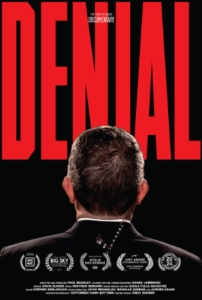 Denial
Denial
I’ll be totally honest: I didn’t think I was ready to watch anything about any election since Kamala Harris’ loss in November, and going back to seeing Donald Trump’s constant accusations of election riggery is not something that I look forward to seeing. Directors Daniel Lombroso and Paul Moakley do not focus on those determined to overthrow the government, but instead shines the spotlight on poll workers and officials working in Maricopa County, Arizona during the 2022 midterm elections. As far-right voters criticize the work of Supervisor Bill Gates, the board and workers strive to make this the most fair and free election that they possibly can.
Why It Could Get In: As a new administration (feeling a sense of deja vu?) prepares to gain access to the White House, fairness in elections is more important than ever. It’s one of the most timely entries in this entire documentary short race.
Where to Watch: The New Yorker
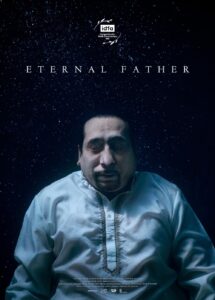 Eternal Father
Eternal Father
Director Ömer Sami hones in on one man’s confrontation of what happens after death in this surprisingly tender and family-focused film. Nasar Ghafor is a healthy man looking towards the future for a way to ensure that he and his family can spend maximum time with one another. He becomes consumed with cryogenically freezing himself upon his death, and it takes hold of his entire family. Would they consider doing it too? Does it actually work? Once again, Sami establishes environment well (seek out his last doc short, Into the Blue), and he gives Ghafor’s family tremendous room to express their concerns and fears.
Why It Could Get In: If Sami pointed fingers or laughed at his subjects, the film wouldn’t work, and he avoids that entirely. We must all confront death when it is our time, so this film carries a unique universality.
Where to Watch: The New Yorker
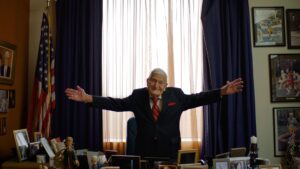 Frank
Frank
Would you still be working at the age of 99? Frank Lucianna wouldn’t dare retire from his law practice (a newspaper clipping framed in his office literally carries that in the headline), and his daughter, another lawyet, admits that their entire family has accepted that Frank will probably die at his desk. David Gauvey Herbert’s portrait both highlights Lucianna’s seventy-year law career, but it takes a somber turn when Lucianna himself expresses how much violent cases have weighed on his heart. Throughout the film, Lucianna throws his arms out almost as if to embrace everyone who enters his office. It’s an image that I will be thinking about for a long time.
Why It Could Get In: This is one of the most uplifing docs in the entire race.
Where to Watch: The New Yorker
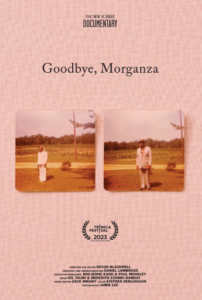 Goodbye, Morganza
Goodbye, Morganza
You will not find a more upstanding tribute to family than Devon Blackwell’s film. You can hear photos being sifted through as her mother, Agnes, recounts how her parents, Alice and Wilson, raised their family in their Morganza home. Thanks to the St. Joseph housing initiative, it allowed Black families become homeowners for the first time, but tax issues led to the family having to become renters instead of owners. Blackwell fills his film with loving montages of the family laughing and singing while the loss feels imminently close. Joy and pain live side-by-side.
Why It Could Get In: Losing a home remains a huge fear to some. This is one of the most personal films in this year’s slate from The New Yorker.
Where to Watch: The New Yorker
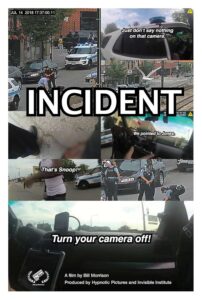 Incident
Incident
Bill Morrison uses sound and silence to marvelous effect as he recreates the moments leading up tot he murder of Chicago barber Harith Augustus in 2018. We go from surveillance camera footage out on the street to the police body cam to dashcams in racing cop cars as tensions mount in real time. When the camera splits into three and four different simultaneous replays, it captures how these horrific moments scramble our emotions and make us wonder how we will move on. This feels monumental in its honesty and editing.
Why It Could Get In: Viewers will not be able to look away.
Where to Watch: The New Yorker
 It’s Okay
It’s Okay
A family’s car ride feels like it carries extra, mysterious weight in David France’s film. The music echoes an intense anticipation as mom and dad bring their son into a community center for what we learn is a drag queen story hour. Queen Shalita reads a book to the children about it being okay to be different. No, drag queen aren’t trying to indoctrinate your child. No, there isn’t a hidden agenda. Queer people just want to teach youngsters that you might still feel differently than others when you grow up. And, yes, that’s okay.
Why It Could Get In: France is a pioneer in queer documentary filmmaking. He was nominated for How To Survive a Plague and his last film, Welcome to Chechnya, was shortlisted in multiple categories.
Where to Watch: The New Yorker
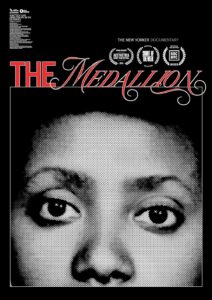 The Medallion
The Medallion
There is deep mysticism and mysteriousness threaded all the way though Ruth Hunduma’s film about her mother’s account of Ethiopia’s Red Terror in the late 1970s. Before now, she never knew what her mother, Ayele, endured, and the directness is deeply affecting. Ayele recounts how she was captured and held as a prisoner before witnessing young men being tortured. “It smelled like blood on blood,” she says about a specific room where prisoners would be taken and later returned with dark stripes on their bodies caused from heavy whippings and beatings. Hunduma’s film is hypnitically edited.
Why It Could Get In: Hundura’s film hits highlights how we do not seek out information or justice about violence made against non-white citizens of the world. If this is just Ayele’s story, imagine how many other stories are out there.
Where to Watch: The New Yorker
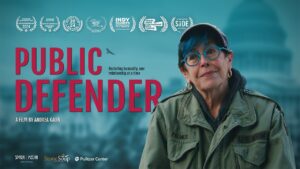 Public Defender
Public Defender
Heather Shaner explains that a criminal public defender’s job is to accept the reality of their client, and she admits that she cannot judge a person before she knows their story. In Andrea Kalin’s engrossing film, we meet two of Shaner’s latest clients: Trump supporter who have been charged in the riots on January 6th. As more people are charged with their involvement on that day, Kalin wises centers her story on Shaner’s ability to handle her job while being open that she doesn’t agree or align with the politics of her clients. The two people on trial are also at opposite ends of their current beliefs. LibertyDragon, the online persona of Jack Griffith/Juan Bibiano is still devout to MAGA while another, Annie, is steeped in regret.
Why It Could Get In: The wounds from January 6th are still being tended to. Will Trump’s re-election invigorate the fight against his supporters? This is not a film about him but how the system needs to be fair and just.
Where to Watch: The New Yorker
 Love to the Max
Love to the Max
“People want to focus on what I am and not who I am,” admits a frustrated Max Briggle, a Texas fourteen year old whose parents are terrified of his future because he is trans. There is a stark difference between the adults who go into a library to teach acceptance and love than the ones who stand outside the library and yell that parents are abusing their children. Parents Amber and Adam Briggle are direct, empathetic, and honest with their fears, and, in an intense and heartbreaking scene, attend a vigil where we hear the names of murdered trans and gener non-conforming people.
Why It Could Get In: Directors Rose Bush and Tanya Selvaratnam give equal weight to fear and hope. It hightlights how the strength of good parenting can guide through a child’s most tumultuous moments.
Where to Watch: The New Yorker
 Seat 31: Zooey Zephyr
Seat 31: Zooey Zephyr
“I knew that we could not stop that bill, so my original speech was a plea to trans youth to please stay alive,” Zooey Zephyr, Montana’s first transgender state representative says near the start of Kimberly Reed’s film. After she is censured by her colleauges for defending gender-affirming care, Zephyr takes a seat on a bench next to the snack bar in the house’s busy halls. Being silenced by the house gains national attention as she does work on her laptop under a bright Post-It hanging on the wall claiming her new seat. As other reps, try to push her around even in the hall, we see the lengths some people will go to bully and intimidate trans and queer folks. Zephyr is there to represent the people and small-minded individuals would rather act like children than do their jobs.
Why It Could Get In: Even if you haven’t heard Zephyr’s name in the news lately, Reed’s film infuriates once again as we see Zephyr standing up for herself on the house floor. We gain exclusive access to the representative as she tried to just live her life and serve her community.
Where to Watch: The New Yorker









